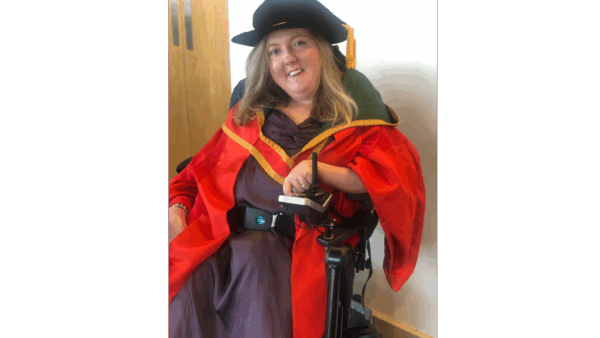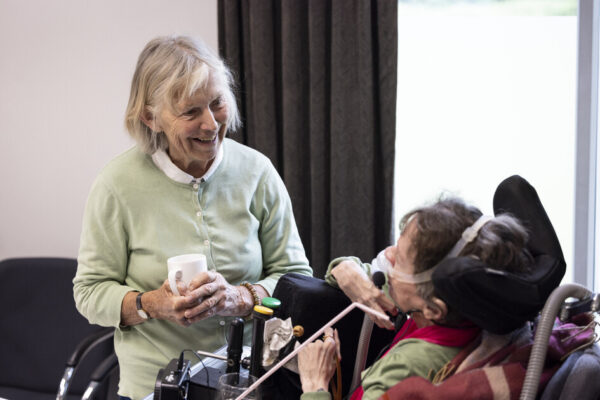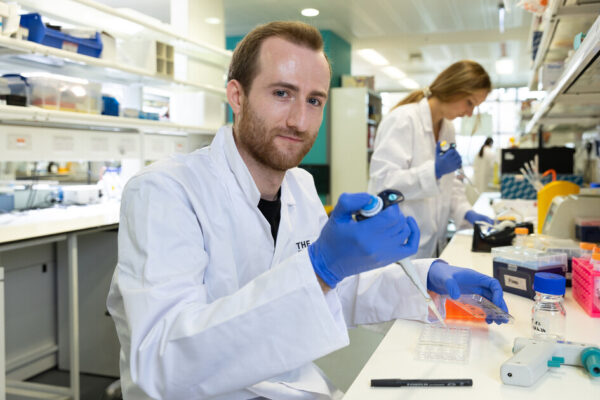Read real life stories from people in the muscle wasting and weakening community. Browse our blogs about a range of topics we think will interest you.
STORIES FROM OUR COMMUNITY
Filter by type

“Plenty of people don’t breathe in the conventional way with modern ventilation”– my research projects as someone with a muscle wasting condition
Suzanne is a researcher at the University of Sheffield and Pathfinders Neuromuscular Alliance. She lives with spinal muscular atrophy (SMA). Suzanne shares her latest research projects on what it truly means to breathe, her own experiences of bone health and why this study is important, and her excitement about being back on our Northern Ireland Council.

“My son’s biggest wish is for ‘a new medicine because then he might be quicker on his feet.’ It breaks my heart he’s being denied that chance” – waiting for givinostat
Sam’s family shares the emotional toll of waiting for access to givinostat, a treatment that could help slow the progression of his Duchenne muscular dystrophy. Every day of delay matters.

PhD student living with LGMD to play key race starter role in the Bidwells Oxford 10k
Tristan Boedts is currently studying for a PhD and has a long track record of adventures and challenges, including a year-long solo trip and hiking to Everest Base Camp, as well as taking part in last year’s Bidwells Oxford 10k. He also has limb girdle muscular dystrophy (LGMD). Tristan tells us why he’s excited to be our official race starter for the Oxford 10k.

Running my first 10k in support of my grandad
On Sunday 11 May, Abby Brammer is taking part in the Bidwells Oxford 10k, inspired by her grandad who lives with muscular dystrophy. Hoping to raise money as well as increasing awareness of muscle wasting conditions, Abby will be joined by thousands of others who have already signed up to take part. She tells us what motivated her to take on her first 10k run.

“We want to give something back”: siblings run Half Marathon in support of mum
On Sunday 6 April 2025, Alex Hughes took part in the London Landmarks Half Marathon. Inspired by her mum, who lives with a rare muscle wasting condition, Alex was joined by her sister Charlotte, twin brothers Tom and Matthew, and family friend Tom Harrison. She explains what motivates her and her family to run and fundraise for us.

The things people don’t see: the everyday challenges of living with a muscle wasting condition
For so many in our community, the small difficulties faced in society can be just as challenging as the muscle wasting condition itself. We asked you to share the everyday frustrations you experience, and some common themes came through like accessibility, a lack of understanding, and managing care.

In conversation: Director Benjamin Ree on The Remarkable Life of Ibelin

Good luck to our London Marathon team
Tomorrow 180 #TeamMDUK runners will run the London Marathon. They have been training and fundraising for months to change the future of muscle wasting conditions. Good luck #TeamMDUK! Thank you for showing just how much our #MusclesMatter. 🧡🏃♂️ In the area? We will be cheering from Tower Bridge, Canary Wharf and Embankment. Come and join us! 📍 Tower bridge: By ‘Tower Bridge Arms’ bar on Tower Bridge road. 📍Canary wharf: Canada Square outside Waitrose (opposite KPMG). 📍Embankment: Along Victoria Embankment, past Charing Cross Bridge, on the right-hand side opposite river. Just after the mile 25 marker. Read more about #TeamMDUK – click the link in our bio!

Meet the man behind the Running Phone Box
Sid Keyte is hard to miss during the London Marathon as he ‘wears’ a 15kg phone box! As he prepares to run his third marathon for us, we caught up with Sid (aka the Running Phone Box) to find out why he’s proud to be part of Team MDUK and how he’s inspired by his brother Robin who lives with myotonic dystrophy.

“I think she’d be proud of me for trying to make a difference”: taking on two challenges in memory of Nana

Warhammer space marine cycles the UK!
Scott Mitchell is back with his incredible ‘Cycle the Nation’ challenge. This May he aims to cycle through every county in the UK in one continuous journey. But this year, he won’t be doing it alone. He’s joined by a unique companion: A Warhammer space marine.

Identifying a potential gene therapy by growing ‘mini muscles’ in a dish
Dr Daniel Moore, who recently completed his PhD funded by us explains how his research has identified a potential gene therapy for laminopathies.